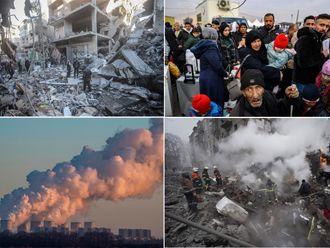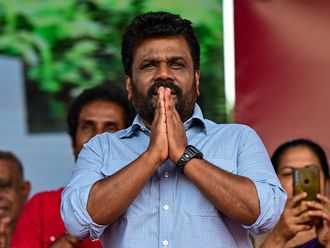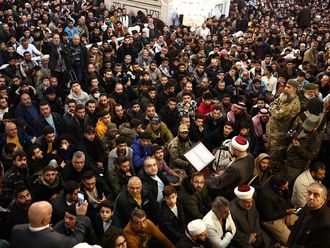Pakistan, referred to by current US Vice-President Joe Biden during the 2008 US presidential campaign as a "dangerous" state, is fighting back against such unwanted allegations.
For nearly nine years, the Pakistanis have been sucked into a regional proxy war courtesy of their ally the US, through no fault of their own, and have not fared well as a result. Neither have their neighbours, for that matter, as the security situation in the region remains uneasy. As the years go by, the situation just keeps getting worse.
Speaking as one
Now, a group calling itself the Coalition of Conscience is making itself heard. Timing its public announcement to coincide with the arrival of US Secretary of State Hillary Clinton in the region, the ‘Stop the War' campaign was launched from the federal capital.
A Charter of Demands, expressing the wishes of the masses who are tired of the endless regional instability shaped by the special interests of foreign powers, was jointly drafted by groups representing the full spectrum of Pakistani public opinion, from liberal to conservative. The coalition comprises representatives from groups as varied as the Pakistani Defence of Human Rights, the Good Governance Forum, the Pakistani Christian Study Centre and the Ex-Servicemen Society.
The Coalition of Conscience has presented both the Pakistani and US governments with very specific demands, and has been very blunt on a number of issues. It recognises the legitimate Afghan resistance to the foreign occupation of that country, accuses the United States and its allies of fostering anti-Pakistan terrorism originating from Afghanistan and calls for the trial of war criminals involved in the war and in the murder of innocent Pakistani citizens via US aerial attacks on Pakistani soil.
Specifically, the document was produced as a result of the people's desire "that political and religious leaders in all our nations lead the way to peace for humanity, to stand united as equals, to save mankind and our planet from extinction". It is an appeal to the international and national conscience and for people to stand up and declare that "enough is enough" because civilisations, cultures and ideologies should not be targeted.
Plainly put
Among some of the salient points of the document ‘Stop The War: A Charter of Demands', are:
• The Government of Pakistan is urged to exercise the nation's legitimate right to secure its interests against all hostile bases inside Afghanistan that are supporting and funding terrorism and insurgency in Pakistan.
• The Government of Pakistan must carry forward the inconclusive negotiations of 1996 and assist all Afghans (Resistance and Northern Alliance) to mediate peace. Support from Saudi Arabia, Iran, Turkey and China, with no covert agendas, is welcomed.
• Support to insurgent and terrorist groups in the Federally Administered Tribal Areas and Balochistan originates from Afghanistan.
• The Afghan resistance movement is led by leaders who are indigenous to Afghanistan and legitimate representatives of resistance to foreign occupation.
• All Pakistani prisoners held by coalition countries, Pakistan and Afghanistan in illegal detention centres must be tried in Pakistani courts.
• War reparations and criminal trials of coalition leaders who have knowingly falsified evidence in support of war before their own people, their parliaments and before the UN Security Council must be brought before the law. All Pakistani leaders guilty of the same must be tried under Pakistan's laws.
Whether or not the production of such a document will have any effect will take some time to determine, but the fact that Pakistanis have put it together may give hope to those of us both inside and outside Pakistan who say "enough is enough".
Tariq A. Al Maeena is a Saudi socio-political commentator. He lives in Jeddah, Saudi Arabia.











